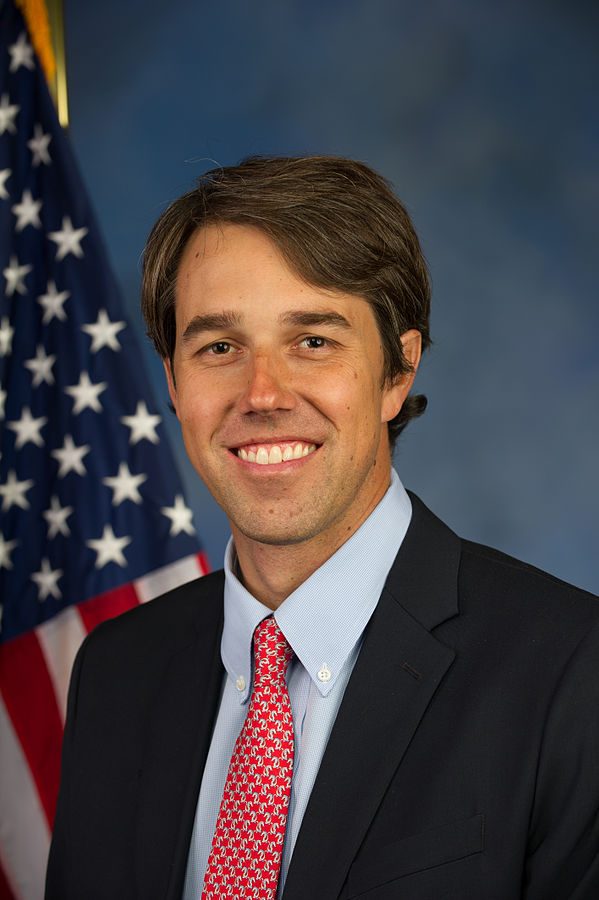The curious case of Beto O’Rourke
O’Rourke is making a presidential run, using the momentum he gained from his Senate race against Ted Cruz.
After the Democrat’s vigorous effort to gain a 2018 Senate seat in Texas, three-term Congressman Beto O’Rourke lost to Ted Cruz by just one percent. Instead of giving up on political glory, O’Rourke announced his 2020 presidential run on March 14, utilizing his well-funded campaign and national attention he gained from his battle with Cruz.
Beto, 46, is now one of the most well-known politicians in the country, behind perhaps only Joe Biden, Bernie Sanders and Alexandria Ocasio-Cortez. O’Rourke initially served on El Paso’s city council from 2005 to 2011, before serving three terms in the 16th district of Texas in the U.S House of Representatives.
O’Rourke raised $78.4 million from one million donors during his Senate bid with the motto “all people, no PACS.” However, presidential runs are incredibly expensive: Hillary Clinton spent $768 million over the course of her campaign, while Trump spent $398 million. O’Rourke will either have to significantly increase his donations or rely on a PAC to help fund his campaign.
The day before O’Rourke’s announcement, Vanity Fair released a somewhat startling cover picturing Beto on the front page dressed in a casual Texan look standing by his pick-up truck on the dusty roads near El Paso. Next to his face was a quote that many would later find offputting: “I want to be in it. Man, I’m just born to be in it,” referring to his inevitable candidacy.
Criticism began pouring in at the undemocratic undertone of the notion that someone considers himself born to be in the Presidency. Digs on social media brought attention to the uncanny resemblance of Beto’s look in the cover to Time’s depiction of Ronald Reagen in the 1981 cover.
In addition, within the article itself, there was a lot of self-aggrandizing and very little substance on policy positions and political plans. Nevertheless, the cover made it clear that the media was giving Beto super-star status per se. Whether it was justified or not is a different question.
The next controversy arose around O’Rourke’s fundraising. During his Senate run, he was extremely transparent about his fundraising numbers and was unwavering in his commitment to not accepting PAC money. However, days after his campaign launch, he wouldn’t give reporters information on how much money his campaign had raised in the first day, numbers that would enable eager journalists to make comparisons to other prominent Democrats’ first day hauls.
When confirmation finally came, even that raised both applause and questions. In the first day, Beto had raised $6.1 million, marginally more than Sanders’ $5.9 million and miles ahead of the next highest candidate – Kamala Harris’ $1.5 million. However, when amazement began wearing off, people began to wonder why the campaign hadn’t reported the number of individuals that had donated, something Beto had consistently done in the past and something that Bernie had done not a month prior announcing that 220,000 had contributed with an average donation of $27.
According to RealClearPolitics, O’Rourke is currently polling at 8.8 points nationally, with 5.0 points in Iowa and 5.3 points in New Hampshire, the two earliest states. In general, he currently sits quite a ways off from the announced Sanders and soon-to-be-announced Biden who are grappling in the mid-20s. Depending on the state, he is marginally behind Harris and is fighting with Warren.
There is a level of uncertainty over where O’Rourke actually stands on policy and who is influencing his decisions. During his Senatorial bid, he started off solidly progressive and began creeping inward on issues like Medicare For All.
Due to the hesitance of his campaign to establish where he stands, we don’t know exactly where he is on many issues, it’s very clear that he has shifted to a much more moderate position than many Democrats currently in the race.
He is to the right of both Sanders and Warren, and with his recent admission that he no longer supports Medicare For All and rather a different healthcare plan called Medicare for America, I place him to the right of both Harris, Cory Booker, and Kirsten Gillibrand, somewhere next to Amy Klobuchar.
Email Vadim at [email protected]










